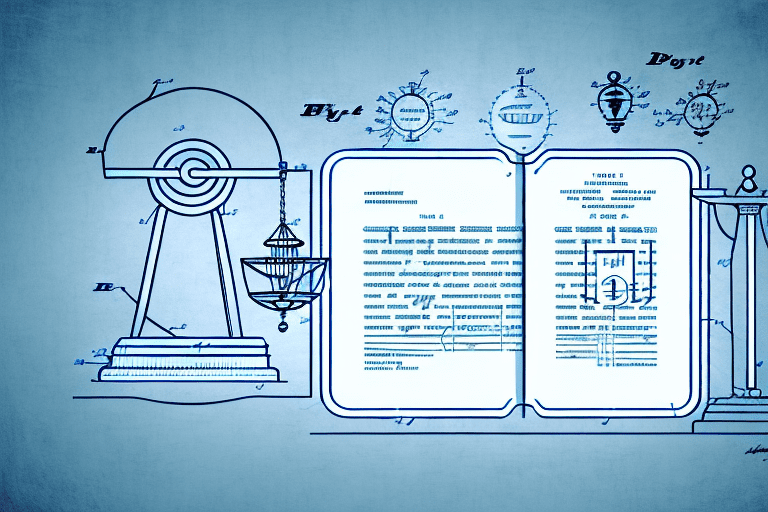In the complex world of patent litigation, expert witness testimony plays a crucial role. Understanding the role of an expert witness and the process of patent exploration is essential for anyone involved in patent cases. In addition, familiarity with the Manual of Patent Examining Procedure (MPEP) and the requirements of the Patent Bar is necessary for those seeking to navigate this specialized field. In this article, we will delve into these topics and explore real-life case studies to shed light on the importance of expert witness testimony in patent litigation.
Understanding the Role of an Expert Witness in Patent Cases
Expert witnesses are individuals with specialized knowledge in a particular field relevant to the patent case at hand. They provide their expertise to assist the court in understanding complex technical matters that go beyond the understanding of the average juror or judge. An expert witness can be a scientist, engineer, or industry professional with in-depth knowledge of the subject matter at the heart of the patent dispute.
Expert witnesses serve as consultants and educators to the court, offering their professional opinions and insights. They are typically called upon to interpret technical terminology, explain scientific principles, provide industry standards, and even demonstrate experiments or technologies. The credibility and expertise of the expert witness can significantly sway the outcome of a patent case.
Defining an Expert Witness
An expert witness is an individual qualified by education, training, and experience to offer specialized insight into a technical subject matter. Unlike fact witnesses who testify about firsthand knowledge of events, expert witnesses are permitted to express their opinions and draw conclusions based on reliable methodologies and practices within their field.
Expert witnesses bring legitimacy and credibility to a patent case. Their qualifications are carefully evaluated by the court to ensure their expertise is relevant and reliable. The process of qualifying an individual as an expert witness involves assessing their education, professional experience, and any certifications or credentials they hold in their field.
Expert witnesses are often sought after for their ability to communicate complex technical concepts in a manner that is easily understandable to the court. They must possess strong communication skills to effectively convey their opinions and findings to both legal professionals and laypersons. This ability to bridge the gap between technical jargon and layman’s terms is crucial in ensuring that the court can make an informed decision.
The Importance of Expert Testimony in Patent Litigation
Expert testimony can make or break a patent case. The technical complexities involved in patent disputes make it crucial to have someone who can bridge the gap between complex technology and the understanding of the court. Expert witnesses provide an objective analysis and interpretation of evidence, helping the court arrive at an informed decision.
One of the primary reasons expert testimony is crucial in patent litigation is the requirement to establish infringement or invalidity of a patent. Expert witnesses play a pivotal role in proving infringement by demonstrating how the accused product or process violates the patent’s claims. They use their knowledge and expertise to assess whether the accused product or process contains all the essential features described in the patent claims.
On the other hand, expert witnesses can also help defend against allegations of patent infringement. They can demonstrate that the accused product or process does not infringe on the patent claims, either due to differences in technical features or alternative non-infringing designs.
Moreover, expert witnesses are instrumental in patent validity challenges. By providing their expert opinions, they can analyze prior art references and argue that the invention described in the patent claims was already known or obvious to experts in the field at the time of filing. These validity challenges can be crucial in determining the enforceability of a patent.
Expert witnesses are often required to prepare detailed reports outlining their opinions and the basis for their conclusions. These reports are submitted to the court and serve as a crucial piece of evidence in the case. The reports must be thorough, well-reasoned, and supported by reliable data and analysis.
During the trial, expert witnesses are subject to cross-examination by opposing counsel. This process allows the opposing party to challenge the expert’s opinions, qualifications, and credibility. The expert must be able to withstand rigorous questioning and defend their opinions with confidence and clarity.
In addition to their role in the courtroom, expert witnesses may also be involved in pre-trial activities, such as assisting with discovery, reviewing relevant documents, and participating in settlement negotiations. Their expertise and insights can help shape the strategy of the legal team and contribute to the overall success of the case.
In conclusion, expert witnesses play a vital role in patent cases by providing specialized knowledge and insights that assist the court in understanding complex technical matters. Their opinions and expertise can significantly impact the outcome of a patent dispute, making them an invaluable asset to both plaintiffs and defendants.
A Deep Dive into Patent Exploration
Before delving into the intricacies of expert witness testimony in patent litigation, it is essential to understand the basics of a patent and the process of patent exploration.
The Basics of a Patent
A patent is a legally enforceable document that grants exclusive rights to an inventor for their invention. It provides the inventor with the right to prevent others from making, using, selling, or importing the patented invention without permission. In exchange for this exclusivity, the inventor discloses their invention to the public in the form of a patent application.
A patent typically consists of a set of claims that define the exact scope of the invention. These claims outline the specific features and elements that make the invention novel and non-obvious. To be granted a patent, an invention must meet certain criteria, including novelty, non-obviousness, and utility.
The Process of Patent Exploration
Patent exploration involves researching existing patents and patent applications to assess whether an invention is novel and non-obvious. It is a crucial step in determining the potential patentability of an invention before investing time and resources into the patent application process.
During patent exploration, inventors and their representatives review various databases and repositories to search for patents that may impact the invention’s patentability. This search includes examining issued patents, pending patent applications, and any other relevant literature or technical resources.
With the help of expert witnesses, inventors can navigate the complex landscape of prior art and analyze the intricacies of existing patents. Expert witnesses provide valuable insights by identifying potential issues, highlighting prior inventions, and determining the patentability and scope of the invention under consideration.
The Manual of Patent Examining Procedure (MPEP) Explained
The Manual of Patent Examining Procedure (MPEP) is a critical resource for understanding the patent examination process conducted by the United States Patent and Trademark Office (USPTO). It provides guidance and instructions to patent examiners, patent applicants, and the public regarding the requirements for patentability and the procedures involved in the examination of patent applications.
What is the MPEP?
The MPEP is a comprehensive manual that covers various aspects of patent examination, including statutory requirements, case law, and USPTO guidelines. It serves as a primary reference for patent examiners during the examination process and provides guidance on interpreting and applying patent laws and regulations.
For patent applicants and their representatives, the MPEP offers insights into the USPTO’s expectations and requirements for obtaining a patent. It helps applicants understand the examination process and prepare their applications accordingly, ensuring compliance with the USPTO’s rules and guidelines.
The Role of MPEP in Patent Examination
Expert witnesses and patent attorneys often rely on the MPEP to navigate the intricacies of the patent examination process. By familiarizing themselves with the MPEP, they can effectively argue the validity of patent claims and address any objections or rejections raised by patent examiners.
The MPEP provides guidance on various aspects of patent examination, such as the requirements for patentable subject matter, the written description and enablement requirements, and the interpretation of claim language. Expert witnesses use the MPEP to ensure their arguments align with the USPTO’s guidelines and precedents, strengthening their testimony and supporting the positions taken on behalf of their clients.
Navigating the Patent Bar
The Patent Bar consists of attorneys and agents who are registered to practice before the USPTO in patent matters. Navigating the Patent Bar can be a crucial step for those interested in pursuing a career in patent prosecution or representing clients in patent cases.
The Importance of the Patent Bar
The Patent Bar is essential because it is a requirement to represent clients before the USPTO in patent matters. Registration with the USPTO as a patent practitioner demonstrates a basic level of competency and knowledge in patent law and procedure. It ensures that individuals providing legal representation in patent cases possess the necessary qualifications and understanding of the patent system.
For individuals aspiring to become patent attorneys or agents, passing the Patent Bar exam is a milestone. It signifies their ability to navigate the complex rules and regulations governing patent prosecution and representation before the USPTO. The Patent Bar provides a platform for professionals to specialize in patent law and serve clients seeking assistance in patent-related matters.
Preparing for the Patent Bar Exam
Preparing for the Patent Bar Exam requires a comprehensive understanding of patent laws, regulations, and procedures. The exam tests applicants’ knowledge of various topics, including patentability requirements, patent prosecution, and patent litigation. Many candidates opt for specialized courses and study materials to enhance their understanding and improve their chances of success.
It is important for aspiring patent practitioners to devote significant time and effort to familiarize themselves with the topics covered in the exam. Practice exams, study guides, and review courses can help individuals understand the format and structure of the Patent Bar Exam, allowing them to effectively prepare and increase their chances of passing.
Case Studies: Expert Witness Testimony in Action
To truly appreciate the impact of expert witness testimony in patent cases, examining real-life case studies can bring the concepts to life. The following two case studies highlight the pivotal role played by expert witnesses in defending and overcoming patent allegations.
Case Study 1: A Successful Patent Defense
In a recent patent infringement lawsuit, Company A found itself accused of infringing a competitor’s patent related to a cutting-edge medical device. Company A enlisted the expertise of an experienced expert witness with a background in medical device design and extensive knowledge of the patent in question.
The expert witness meticulously analyzed the accused product, studying its technical specifications, construction, and operation. By comparing the patent claims to the accused product’s features, the expert witness was able to provide compelling evidence that the accused product did not infringe on the competitor’s patent claims.
Furthermore, the expert witness offered alternative non-infringing designs that demonstrated the presence of prior art references predating the competitor’s patent. This testimony successfully invalidated the competitor’s patent claims, resulting in a favorable outcome for Company A.
Case Study 2: Overcoming Patent Infringement Allegations
Another notable case involved a patent holder accusing Company B of infringing on their patented software algorithm. Company B engaged the services of an expert witness specializing in software development and algorithm design.
The expert witness meticulously analyzed both the patented algorithm and Company B’s software product in question. Through comprehensive testing and precise examination, the expert witness demonstrated that Company B’s software did not use the patented algorithm but instead employed a different method to achieve the desired outcome.
The expert witness’s technical expertise, combined with a thorough understanding of the patent claims, disproved the allegations of infringement. Company B successfully defended against the patent holder’s claims, highlighting the crucial role played by expert witness testimony in protecting their intellectual property rights.
In conclusion, expert witness testimony plays a vital role in patent litigation. From understanding the role of an expert witness to exploring the complexities of patents and the MPEP, this article has shed light on the various aspects of expert witness testimony in patent cases. By thoroughly comprehending the importance of expert testimony, aspiring patent professionals and stakeholders in patent disputes can navigate the intricate world of patent litigation with greater clarity and confidence.






